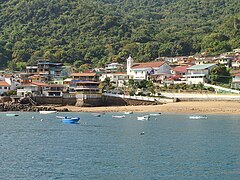Isla Taboga
|
Native name: Isla Taboga Nickname: Island of Flowers |
|
|---|---|
 |
|
| Geography | |
| Location | Gulf of Panama |
| Coordinates | 8°47′0″N 79°33′0″W / 8.78333°N 79.55000°W |
| Area | 12.1 km2 (4.7 sq mi) |
| Administration | |
| Province | Panamá |
| District | Taboga |
| Demographics | |
| Population | 1.629 |
| Pop. density | 134.6 /km2 (348.6 /sq mi) |
Coordinates: 8°47′0″N 79°33′0″W / 8.78333°N 79.55000°W
Taboga Island (Spanish: Isla Taboga), also known as the "Island of Flowers", is a volcanic island in the Gulf of Panama. It is a tourist destination, about 20 km from Panama City, Panama.
The island was discovered in the 16th century and was originally named Isla de San Pedro by the Spanish explorer Vasco Núñez de Balboa. Its current name derives from an Indian word aboga ("many fish"). The island's first settlers were Indian slaves from Venezuela and Nicaragua. The small town of San Pedro was founded in 1524 by Hernando de Luque, dean of the Panama cathedral. The town church of the same name is claimed to be the second-oldest church in the hemisphere. Rose of Lima (1586–1617), the first Catholic saint of the Americas, may have been born on the island. French painter Paul Gauguin visited the island in 1887.
At low tide, the northern end of the island is joined by a sand bar to the small island of El Morro, and the southeastern end is 270 metres (886 feet) from the neighboring Urabá island. The island has a tropical rain forest climate (Af), with average daytime temperatures of 83 °F (28 °C). It is famous for its beautiful beaches, clear waters, soft sands, and wildlife refuge.
...
Wikipedia

